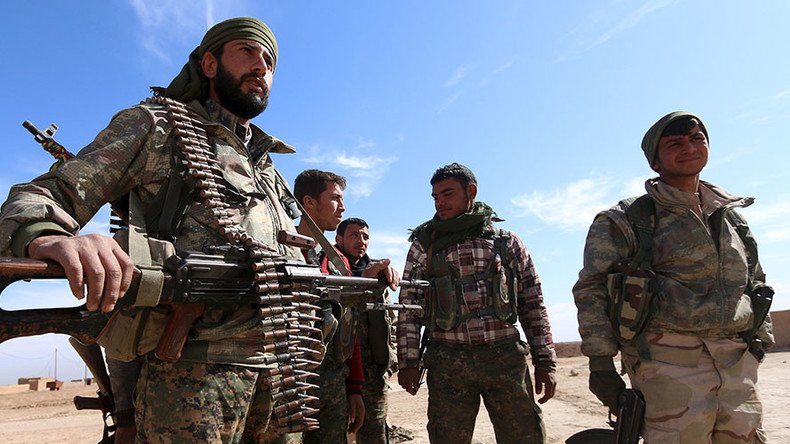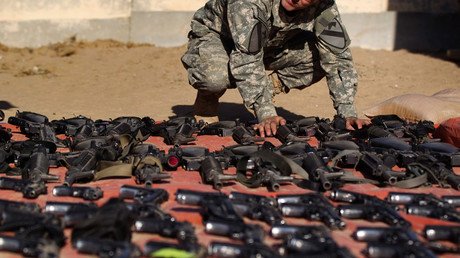In Syria, Pentagon keeps allies on short leash

The US provides its Syrian allies with only enough ammunition and weapons for the current operation, Pentagon officials said, seeking to avoid scandals such as the CIA-run weapons program in Jordan, or last year’s fiasco with US-trained fighters in Syria.
Weapons the CIA bought in the Balkans and routed through Jordan to “moderate rebels” in Syria were “systematically stolen” by renegade intelligence Jordanian officials, a report by the New York Times and Al-Jazeera charged on Monday.
Among the stolen weapons were rifles, mortars and rocket-propelled grenades (RPG), and some of the purloined armaments may have been used to kill two Americans and three others at the police academy in Amman last November, the report said.
The Pentagon has implemented safeguards to avoid a similar problem, according to two officials who spoke with The Washington Post on condition of anonymity. The US-backed forces in Syria are only provided limited amounts of ammunition, enough for one operation at a time, while the Special Forces operators embedded with them keep an eye on US-provided weapons.
“These are… transactional relationships,” one official told the Post. “We provide enough for them to accomplish the next objective.”
Fewer than 100 Syrians have been trained by US advisers to fight against Islamic State (IS, also known as ISIS/ISIL), but the Pentagon claims the new program is much more successful than last year’s fiasco, citing recent advances by US-backed forces on the ground.
The US is focusing on identifying “vetted” groups inside Syria and training them to call in airstrikes against Islamic State (IS, formerly ISIS/ISIL), Brett McGurk, the US official in charge of the coalition against IS, told lawmakers on Tuesday.
Testifying before the Senate Foreign Relations Committee, McGurk said the coalition efforts to roll back the terror group were making progress, citing the Iraqi liberation of Fallujah and the siege of Manbij by the Syrian Democratic Forces (SDF) – a “mix of Syrian Kurds, Arabs, Syriac Christians, and Turkmen” – following a surprise attack across the Euphrates River earlier this month.
“As we speak, these fighters are now entering the city limits, under cover of coalition air support,” McGurk testified, adding that Manbij was home to the “logistics nodes” for recent suicide attacks in Paris, Brussels and Ankara.
US-trained Syrian rebels with weapons end up in hands of Nusra jihadists http://t.co/xTSkKzUdCypic.twitter.com/EZbPXVycFB
— RT (@RT_com) September 23, 2015
SDF is supported by some of the 300 US Special Forces operators currently deployed in Syria. The group was established in October 2015, after the Pentagon scrapped its “train and equip” program designed to build an anti-IS army from the ground up. The $500 million program had ended up training fewer than 200 fighters, almost all of whom were either captured by the Al-Nusra Front terrorists or ended up defecting to them, along with their US-issued weaponry.
The new training program is focusing on specialized “spotters,” not regular infantry, Pentagon officials told the Post. These special soldiers are trained outside Syria, then returned to the country to help the local forces receive proper air support from the US-led coalition.
“What we’re looking at now is taking out key enabler personnel from certain units, training them and then reinserting them so they can provide information to the coalition to enable us to then target [IS],” one official told the Post.
New US training pgm for #Syria rebels has trained <100 - by @missy_ryan@washingtonposthttps://t.co/4iy0FpXkcGpic.twitter.com/vDGvvHs7fP
— Christian Thiels (@ThielsChristian) June 28, 2016
The Pentagon is looking to expand the program, potentially within Syria itself, the officials added. The US military is currently supporting “various friendly Syrian factions across the country,” the Post reported, including “moderate” rebels in northwestern and southern Syria, along the borders with Turkey and Jordan.
However, McGurk admitted in his testimony that the “moderate opposition” was getting “increasingly interwoven” with the Al-Nusra terrorists.














